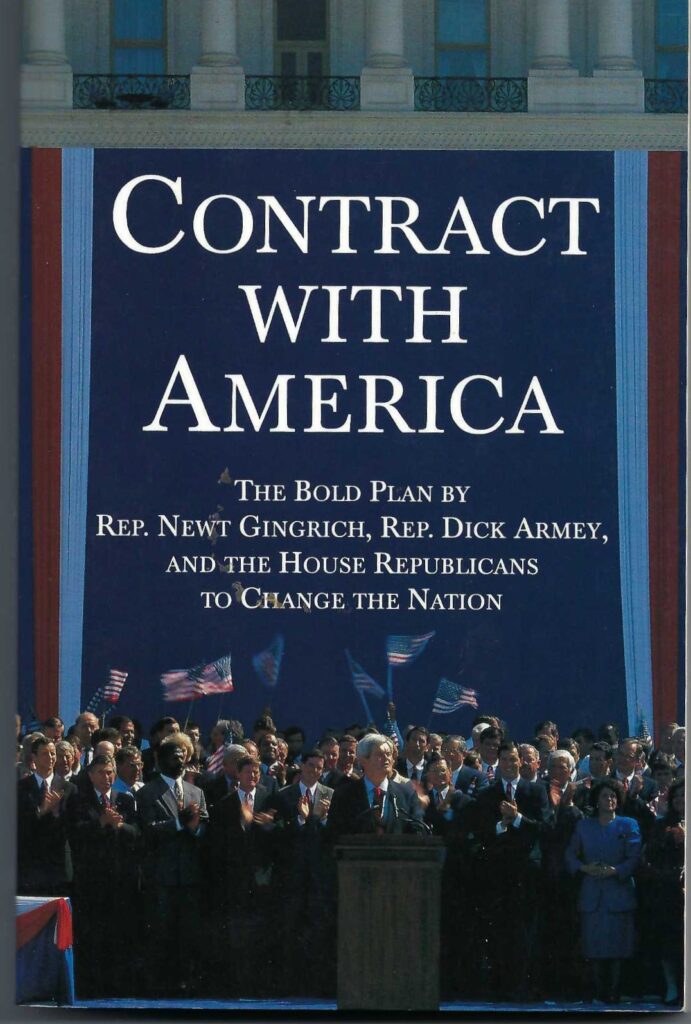Commentary
When I began hearing that the Republicans were planning to unveil a plan to tell voters how they planned to tackle the issues that concern them, I pulled my copy of the 1994 Contract With America, the bold plan authored by Rep. Newt Gingrich and Rep. Dick Armey and signed by 367 Republican candidates.
For those of who were not yet of voting age in 1994, you missed being part of a major turning point on Election Day, November 8, 1994. America’s voters dismantled the forty-year lock Democrats had on Congress, giving Republicans control of the Senate and the House.
For the first time in more than 130 years, a sitting Speaker of the House – Tom Foley – was defeated for reelection, and two of the left’s most powerful committee chairmen in the House were voted out.
Voters sent a clear, undeniable message. It was about throwing out the Democrats, and not a single incumbent Republican congressman, senator or governor was defeated.
The Contract contained five principles to describe their basic philosophy: Individual liberty, economic opportunity, limited government, personal responsibility and security at home and abroad.
I understand that Republican Minority Leader Kevin McCarthy will introduce the Commitment to America in Pittsburgh on Friday. So far, little official content has been leaked or released, except that it will cover the key issues on the minds of Americans today.
Just as the Contract With America was signed just weeks before the 1994 midterm, the Commitment to America will provide voters with a clear choice in the 45 days remaining before the 2022 midterms.
Those Elusive Prescription Drug Price Reductions
President Biden got what he wanted. His party fashioned an act with a title designed to make voters believe he was attacking the issue of inflation as Democrats struggle to maintain control in the upcoming midterms. In the process, his approval rating jumped to 45 percent.
There’s good reason why not a single Republican voted for the falsely-named Inflation Reduction Act. It won’t reduce inflation.
The Act consists primarily of the largest investment in combatting climate change in U.S. history, which explains why the media has generally been referring to the Act as the “climate change bill.”
But Biden knows that lower prescription drug prices and taxing those greedy corporations is what his supporters like to hear.
Though the president likes to refer to the reduction of prescription drug prices in the Act, he’s effectively pulling the wool over the eyes of voters. He fails to mention that the timeline for the majority of the provisions reveals that they don’t take effect until the years 2024-2029. Those out-of-pocket prescription drug costs to be capped at $2,000 in Medicare don’t phase in until 2025.
The left’s assault on Big Pharma to reduce drug prices isn’t without a danger. The Congressional Budget Office estimates that reducing the pharmaceutical industry’s revenues would result in two few drugs in the next decade, 23 fewer in the following decade, and 34 fewer drugs in the third decade.
Some believe, however, that the drug firms are nowhere near as important to real drug innovation as they purport to be, citing increased funding by the National Institutes of Health.
Not so, say researchers at the University of Chicago, who predict a 29-60 percent reduction in R&D from now to 2039, with 167 to 342 newer drug approvals in that period, as $663 billion less is invested by Big Pharma. That would include $18 billion less spent on cancer research per year.
“The Inflation Reduction Act will put a halt to decades of private sector progress in the war on cancer.” – Prof. Tomas J. Philpson, University of Chicago
May God continue to bless the United States of America






